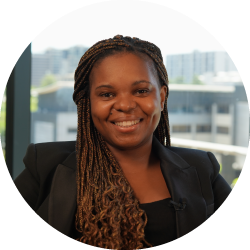Meeting the Skills Gap: The Career-Boosting Benefits of Lifelong Learning
“What has created the current skills gap is that we’re not moving as fast as we know we should be moving. We need to get better with technology, but at the same time, we don’t want to get left behind on the human side of things.”
Vuyile Mbatha, Corporate Head of Leadership & Learning
Meet Vuyile

Growing up, Vuyile Mbatha had an inquisitive mind. The only sport she had an affinity for was chess. “I figured I’m more of a thinking person; let’s get into books, let’s understand things, let’s strategize,” she admits. As the corporate head of leadership and learning for a financial service firm, her natural curiosity and thirst for knowledge has propelled her career and expertise forward. Having completed not one, but 15 courses through GetSmarter – from the LSE Negotiation Programme, to High Impact Leadership from the University of Cambridge Institute for Sustainability Leadership (CISL), to MIT Sloan’s Artificial Intelligence: Implications for Business Strategy – her learning journey has followed an exemplary trajectory.
Over and above being a PhD candidate at the University of Witwatersrand, Vuyile works at a financial services firm where she heads up leadership, development, learning, and talent. “Lifelong learning is innate. It’s about believing that if there’s something I’m not able to do, it’s not that I’m incapable of doing it, it’s that I can’t do it yet,” she advises.
“Online learning can help individuals and businesses go a long way. It’s literally learning at your fingertips, in your own environment, from the comfort of your home and at your own pace.”
Why do I need to be proactive about lifelong learning?
How people are evolving in the world of work, and the rate at which new skills are needed, is a question on many a professional’s mind. The answer is simple: with every new technology, innovation, regulation, and system, the most in-demand skills shift. Now, more than ever, employees and leaders need to stay abreast – or better yet, ahead – of change.
Vuyile maintains that it’s within everyone’s reach to grow and achieve more, largely by continuously advancing and developing their skills. “Learning is literally something I do every single day, and I help others get access and opportunities to do the same.”
Lifelong learning, according to Vuyile, requires dedication, focus, and a level of introspection, the combination of which can help identify where your skills gaps are. “When studying a course about leadership, for example, it feeds into my PhD, which feeds into the work I do as well as my day-to-day life,” she says. In terms of personal development, Vuyile asks herself two questions: what do I need right now to be the best version of myself, and what is it that I need in my future?
Acquiring new and better forms of knowledge
The people who will thrive in the 21st century will be those who embrace lifelong learning and continually increase their knowledge, skills, and competencies. Studies reveal that those who maintain their ability to learn outpace other professionals. The most sought-after skills are critical thinking and analysis as well as problem-solving and self-management, which comprises active learning, resilience, stress tolerance, and flexibility. The people who will thrive in the 21st century will be those who embrace lifelong learning and continually increase their knowledge, skills, and competencies. “You need to understand yourself as an individual,” shares Vuyile. “We all learn in very different ways. Be honest about what it is that you’re good at and what it is you still need to work harder at.”
Answer the call to learn for a lifetime
Vuyile’s drive and learning journey may not be for everyone, which is why GetSmarter’s short course offering is designed to meet you where you’re at. “You have a plethora of world-class university offerings,” Vuyile explains. “As a learner, I was able to learn and interact with like-minded peers from around the world, and study with fantastic universities.”
“The advice I would give to prospective students is to find something you’re passionate about. Look at the gaps you have right now and choose a course that’ll not only help you excel in your current role, but also make you stay relevant in the future.”
Address the ever-changing skills gap by embracing the need to learn and upskill